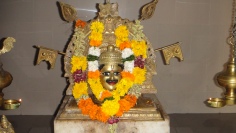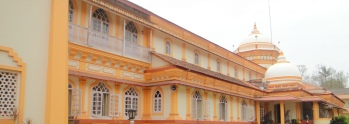This is a bronze bust of my great-great-great-great-great-great-great grandfather. It is enshrined in our family temple in Goa. He was one of the five men who saved the sacred idols of the deities from Portuguese invaders in the 16th century.
This is our temple, the Ramnathi temple, in Ponda, Goa. It was originally in Loutolim, but was destroyed by the Portuguese. A new temple was consecrated to the deity in Ponda, 11 km away across the Zuari river.
This is what my ancestors who lived in Goa at the time of the Goa Inquisition in the 16th century were up against. The Goa Inquisition by A.K.Priolkar is a well-researched book that chronicles details of that time.
To begin with, the Portuguese had a 41-point code for Goans, some of which were:
- No worshipping their own deities
- Ban on wedding-related activities like distribution of betel leaves and flowers, serving a wedding meal
- Restriction on wearing Indian garments
- No observing religious fasts, performing obsequies
- No growing tulsi in their backyards
- No building or maintaining temples; violation was dealt with by demolition of the temple and confiscation of its wealth for pious (?) work by the Portuguese.
Those who flouted these and other random rules – something that was bound to happen, because all the things on the Portuguese’s list of bans were a normal part of life for Goans – fell afoul of the Goa Inquisition. They would be tortured in the presence of their families by being beaten up, having their eyelashes yanked out, or bones broken. . .
By 1570 they had a law that said people who did as they were told didn’t have to pay taxes for 15 years, as long as they used their brand new Portuguese names and erased all memories of who they used to be!
The moral of the story of the persecution of my forefathers in Goa by the Portuguese, as I gathered in bits and pieces over the years, was this: “Everybody has his own idea of God and that’s okay, because nobody’s seen God. What the Portuguese people did was wrong. They were ignorant. Our forefathers left our homeland because it was important for them to be independent, not live like slaves”. In other words, accept that every religion is okay and don’t impose your beliefs on others. But hold on to your convictions, because they make you who you are.
If every child learns this there will be less distrust and hatred among people in the future. Since a large number of wars have been fought over religion, there may be fewer wars too. And perhaps people wouldn’t feel it their duty to torture those who worship god by a different name.
In theory, it would be best if people could be ‘good’ without theism. In organized religions, rules for good conduct are laid down on the premise that people will fall into sin without them. Does that mean a majority of people need a God to stay their course in that direction? The fact that thousands of places of worship exist in every country, maintained by thousands of religious heads, makes me think that’s likely; of course there are social, economic and political reasons for the existence of places of worship too, but I’ll ignore that for the moment.
Obviously then, theism will not go away. The only way forward would be to allow everyone their own brand of theism.
Just as I will not blindly accept someone else’s beliefs, I won’t foist mine on others by any means, blatant or subtle. Should I induce a person to adopt my religious beliefs, depriving him of the inner growth that comes with thinking things out, I would be stunting him. He would be the human equivalent of a Sequoia tree in its bonsai form. I can’t feel good about it, nor can I score brownie points with my god, if he’s a fair god.
I know that what my forefathers went through is exactly what indigenous populations everywhere went through when explorers decided that they owned not only the lands they ‘discovered’ or ‘conquered’, but the human beings who lived there as well. Any reader can look back at the history of his own land to know I’m right.
Shouldn’t we try to change the status quo? How? By teaching kids to be tolerant, and never telling them, “Our God is the only true god, other religions have it wrong.” By telling them instead, that religions are different paths that lead to the same god. Or, if we are mature and secure enough, telling them that religion isn’t about god at all, it’s just a way of life.
Others’ thoughts on the topic:


Beautiful piece of writing. We are blown away by the fact that you have been able to trace your lineage so far back.
LikeLike
It felt strange when I first saw that bust… This whole concept of all living beings carrying genetic material that is thousands of years old fascinates me. Everybody that has ever lived and had children continues to live through them…
LikeLike
Very poignant, this is an inspiring read, hope we all think like this. Sad to know that your ancestors had to face this though. Keep writing! 🙂
LikeLike
Thank you for visiting, Shradha 🙂
LikeLike
Thank you for sharing the details. Our family Kul-purush is also enshrined the the small room above the temple. I pay my respects there on every visit, but his name escapes me. We are from the Kalbagkar branch settle in Kumta. Where is your family from?
And Thanks for linking to my article.
Arun
LikeLike
From Gurupur, Dakshina Kannada, for the past seven generations. On the door of the room in which our kul-purush is enshrined there is a list of names and mobile numbers of people descended from him. I took a photograph of the list because I was fascinated: “I share genes with all these people from about three-four hundred years back!” But I can’t imagine what it would be like to actually dial one of those numbers and strike up a conversation!
LikeLike
Religion isn’t about God at all. It is a way of life- Wonderful summing up. It is pathetic to read about the sufferings your ancestors had to undergo for no fault of theirs. The pain they suffered was in a far too distant past but we feel them now thanks to your writing. Only yesterday, I mailed you about articles in Goan newspaper and today read this blog -about your great-great…. Goan connections. What a coincidence !
LikeLike
very interesting to read these small bits of history that have contributed so much to what we are today. Glad you took the trouble to pull out these facts. Keep up your writing, Doc
LikeLike
Thank you. My aim in writing is to draw attention to how easy it is to maintain peace within the human race, brotherhood within our country, and goodwill towards all, if we all treat our race/religion/language and other divisive labels as nothing more than surnames for identification, something superficial. Underneath these, we are all connected as creations of the same Force.
LikeLike
Very interesting indeed. Thanks for sharing. My family is also from Goa originally, having fled to Karwar during the Portugese inquisition. It is interesting that the Church in Portugal , and the Vatican, consented to the torture. This has been a source of debate, and there has been discussion of publicly coming out and holding the Vatican accountable if only to bring this to the attention of a wide audience. You may want to read a book by Stephen Knapp ( don’t remember the exact name) and he goes into great detail into the crimes committed by the Portugese in Goa in the name of Christianity. It is painful to read. Sharad Wagle .
LikeLike
Thanks for stopping by. I will check out Stephen Knapp, though I’m sure it’ll make depressing reading…Religion would be simple and useful if it were merely personal, or social within a small, loose framework – like Tambrahm, Saraswat, Lingayat, where you are happy belonging to your group but appreciate that other people are happy being in their own groups too. No being judgmental, no running down other people’s belief systems, no maintaining only you and your group know who god is…
LikeLike
Dr Shyamala,
This was definitely inspiring to read. I completely agree with Mr. Vishwanathan that religion and God are two separate entities. Religion, according to me, is just a medium to understand God. And, I very emphatically believe that there is God within each one of us. We need to educate our children about tolerance and respect for others’ beliefs and imbibe in them a very strong value system. They should understand that every human being has a right to live the way he or she chooses to. And, also understand that one man’s freedom ends where the other man’s nose begins!
Thank you for sharing this post. This definitely goes a long way in motivating me further to teach my son to be a tolerant and considerate human being first – before he makes a choice of religion for himself; if he must, that is!
LikeLike
Thank you for visiting, and your response affirming the need to teach children to respect others’ beliefs. Also, what you’ve said about defining where your freedom ends: this is the line we cross when we presume to tell other people what to believe.
LikeLike
Was really inspired reading this article . Appreciate you for gathering so much of the past facts .I agree with Mr.Vishwanath that religion is not about god at all and beautifully summed up by you in one sentence.Keep writing
LikeLike